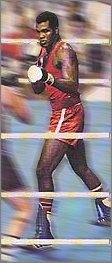
Cuba: The New Boxing Superpower

Professional Cuban Boxers
The next question seems to be whether Cuban fighters would do as well in the professional arena. For starters, experts say, professional competition is much more intense. Pro contests are longer, more frequent, and participants wear lighter gloves and no headgear. But W. Gregory Guedel, in his article "Is Cuba the Future of Professional Boxing?" asserts that "these fighters possess the superior fundamentals and competitive mindset that true contenders require."
Lovers of the sport and boxing insiders point out that since Cuba's impressive dominance in amateur competition began in 1972, no Cuban has dominated their weight class upon becoming professional. Indeed, many of those who have defected turned out to be disappointments as pros (Joel Casamayor being one of the exceptions).
"For many expatriate fighters, the rigid and regimented Cuban system they despised was the key element of their personal success. Without it there is a loss of psychological focus required for top-level performance."
A critical factor for this lackluster performance may be the number of perks and distractions available to successful athletes in capitalist cultures. Coming from a relatively impoverished society, and suddenly having access to everything that money can buy, will hamper even the strictest level of concentration. This can suddenly become the biggest challenge faced by young boxers, and by the time they figure out how to handle their new wealth, the clock and the forces of nature are no longer on their side.
"It seems that for many expatriate fighters, the rigid and regimented Cuban system they despised was the key element of their personal success," writes W. Gregory Guedel in his article Is Cuba the Future of Professional Boxing? "Without it there is a loss of psychological focus required for top-level performance."
The undeniable fact is that many great American champions started out at the Olympics: Muhammad Ali, Joe Frazier, George Foreman, Sugar Ray Leonard and Evander Holyfield.
- -
A Cuban athlete that makes it into a national team is expected to support the regime, so it's not difficult to see how some players might willingly stretch their ideology for a chance to compete on the world stage.
Joel Casamayor didn't want to fake a "sympathy" he didn't feel deep down in order to be a world-class fighter. His refusal to join the Union of Young Communists limited the rewards he would receive for winning the gold medal at the 1992 Olympics in Barcelona. It would certainly affect his ability to be part of future Olympic or world competition teams. Casamayor defected just before the 1996 Olympics and turned pro shortly thereafter.
Casamayor's example may teach us not to judge Cuban athletes by the politics of US-Cuba relations. Observers point out that many who look at Cuban boxers see "Castro," and this may be a grave mistake. Most Cuban boxers fight for Cuba and Cubans, not for "Fidel" and communism. They fight for their own dignity and individuality, even if they're not allowed to express it openly.
They fight for the legacy left by men like Martí, Maceo and Gómez, who had little time in their own lives for sports. They fight to honor other Cuban athletes who have come before them.
That deep sense of nationalistic pride that intersects personal ambition is difficult for many to comprehend, but it is a strong part of what's made Cubans survive the rage of large empires for centuries. It's also one of the reasons why Cubans are so internationally competitive.
Says Cuban baseball commissioner Carlos Rodriquez, "an athlete is selected to defend our country, all of our nationality. If he doesn't have an attitude where we-the people who created him-can have confidence in him, then he will never have the right to represent Cuba in an international event. He not only must be physically prepared, but on top of everything he must be patriotic, dignified, and participate like the athlete he is."
The names of Cuban ballplayers have become prominent in professional American baseball; Jose Canseco, Livan Hernandez, Jose Contreras, Rey Ordonez, Rafael Palmiero, Orlando El Duque Hernandez, Rolando Arrojo, and others in increasing numbers. Can we expect the same in professional boxing?
Says Humberto Rodriguez in Pitching Around Fidel; "We defend values-patriotic, human."
"Men's sacred values are beyond gold and money," said Fidel Castro to a crowd at the Plaza of the Revolution in 1971. "It's impossible to understand this when you live in a world where everything is bought and sold and gotten through gold."
End
[This article is still being refined and will be completed by the first day of the winter solstice. Please consider it a Beta Version and feel free to contact me with comments and/or observations. Now, in this corner…]

Cuban Boxing 1 |
2 | 3 | 4
Cuban
Boxers | Professionals |
References & Resources |
Cuban Sports Timeline